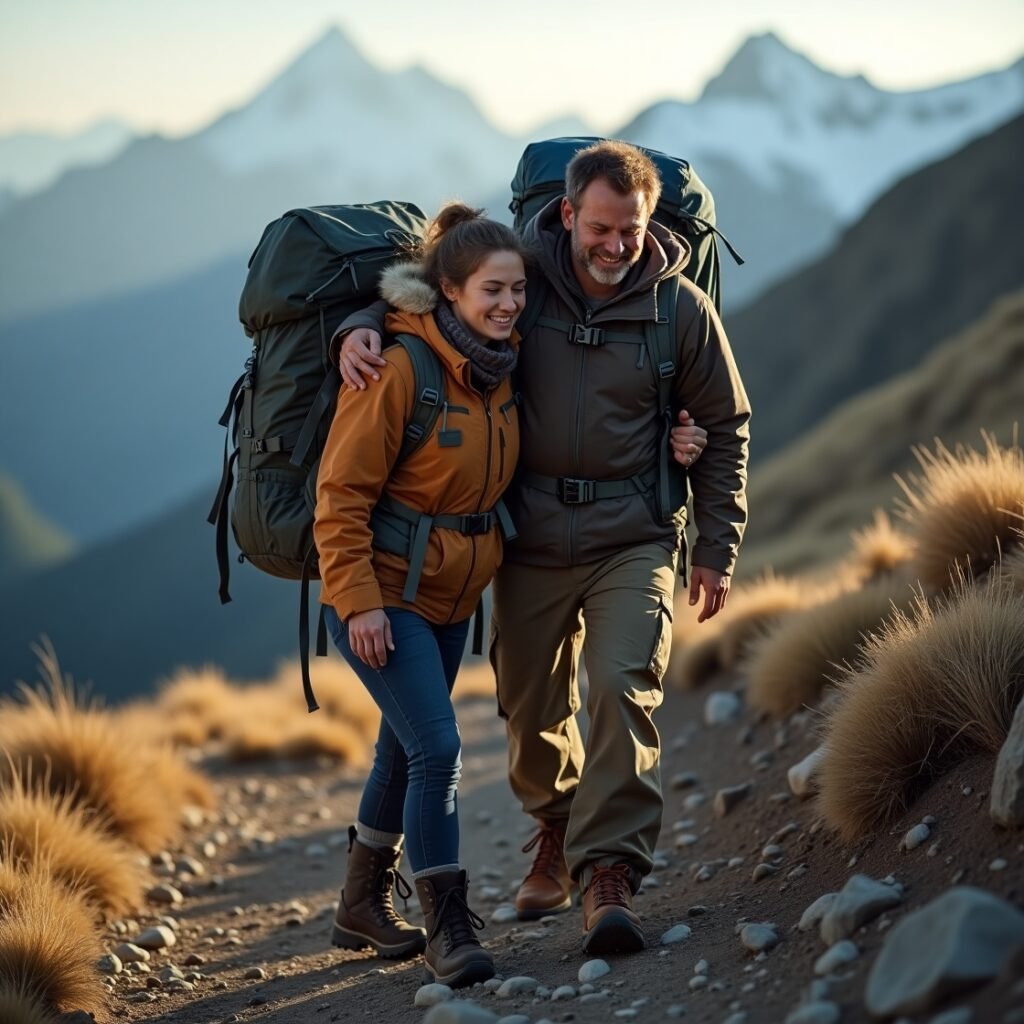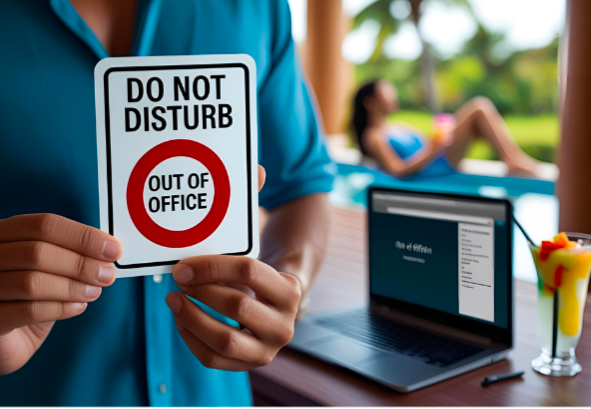
Sarah and Mike’s marriage was hanging by a thread after 18 months of pandemic lockdowns, job stress, and endless arguments over everything from dishes to finances. Three sessions with a couples therapist yielded nothing but awkward silences and a $600 bill.
Then they decided to climb Mount Whitney together.
“Somewhere around mile 8, when we were both exhausted and I was crying from altitude sickness, Mike carried my pack for three miles without saying a word,” Sarah recalls. “That’s when I remembered why I married him.”
They’re not alone. A growing number of couples are ditching traditional therapy for adventure therapy travel — shared challenges in extreme environments that force couples to rely on each other, communicate under pressure, and rediscover their partnership.
Welcome to the world of couples adventure therapy, where relationships are rebuilt one terrifying, transformative experience at a time.
Chase the Stars, Not Hotel Check-Ins with RVezy
Why settle for ordinary when you can take your love for the night sky on the road? With RVezy, you can rent an RV, motorhome, or travel trailer and set up camp under the clearest skies across North America. Imagine enjoying the Milky Way from the comfort of your own mobile home!
Every RVezy booking includes:
- $2M Insurance for peace of mind
- 24/7 Roadside Assistance for any bumps along the way
- Bilingual Support for easy communication wherever you are
All you need to focus on is finding the perfect spot to enjoy the stars.
Get $25 off your USA booking with promo code RVEZYUSA25
Book your stargazing getaway now at RVezy.com and experience the cosmos your way!
What Is Adventure Therapy Travel?
Adventure therapy isn’t just extreme sports with your partner. It’s the intentional use of challenging outdoor experiences to address relationship issues, build trust, and develop better communication patterns.
The psychology is simple but powerful:
- Shared vulnerability creates emotional intimacy
- Mutual dependence rebuilds trust and teamwork
- Achievement together creates positive shared memories
- Communication under pressure reveals true relationship dynamics
- Overcoming fear together deepens emotional bonds
Unlike sitting in a therapist’s office talking about problems, adventure therapy forces couples to solve problems together in real-time.
The Science Behind Shared Fear and Bonding
Research from the University of British Columbia found that couples who experienced high-arousal activities together (like bungee jumping or white-water rafting) showed significantly increased feelings of attraction and relationship satisfaction compared to couples who did low-arousal activities.
Why? The misattribution of arousal theory:
When your heart is racing from fear or excitement, your brain can misinterpret those physical sensations as attraction to your partner. Add successful teamwork to overcome the challenge, and you’ve created a powerful cocktail of bonding hormones.
Dr. Helen Fisher, anthropologist and relationship expert, explains: “Shared novel experiences trigger dopamine release in the brain — the same chemical associated with romantic love. Couples who seek new adventures together literally re-activate the neurochemical systems of early romance.”
Real Couples, Real Transformations
Jake and Amanda: From Divorce Papers to Everest Base Camp
The Problem: After 12 years of marriage, Jake and Amanda had grown into roommates who barely spoke. Amanda had drafted divorce papers.
The Adventure: Three-week trek to Everest Base Camp in Nepal
The Breakthrough: “Day 8, I got severe altitude sickness. Amanda stayed awake all night monitoring my breathing, holding my hand, talking me through panic attacks. I realized she still loved me — she was just as scared of losing our marriage as I was.”
The Result: They’re now planning their second Himalayan adventure and report their marriage is stronger than it’s been in years.
Marcus and David: Rebuilding Trust After Infidelity
The Problem: Marcus discovered David’s affair six months earlier. Trust was shattered, communication had broken down completely.
The Adventure: 14-day survival course in the Utah wilderness
The Breakthrough: “When you’re depending on someone to help you start a fire so you don’t freeze to death, past betrayals become secondary to immediate survival. We had to communicate clearly, work as a team, and rely on each other. It rebuilt our foundation from scratch.”
The Result: They credit the experience with saving their relationship and are now certified wilderness survival instructors.
Lisa and Tom: From Empty Nesters to Adventure Partners
The Problem: After their last child left for college, Lisa and Tom realized they had nothing in common except parenting.
The Adventure: Multi-sport adventure race in Costa Rica (kayaking, rock climbing, trail running)
The Breakthrough: “We discovered we were both competitive, both stubborn, and both willing to push through discomfort for each other. We weren’t just parents — we were partners who happened to have raised kids together.”
The Result: They’ve completed adventure races on three continents and describe themselves as “more in love at 52 than we were at 25.”
Travel with Peace of Mind: Get Covered with VisitorsCoverage
When you’re traveling abroad, the last thing you want to worry about is what happens in case of an emergency. With VisitorsCoverage, you can protect yourself with comprehensive travel medical insurance tailored for international travelers.
Why choose VisitorsCoverage?
- Medical emergencies covered: Stay protected with coverage for unexpected health issues.
- Trip interruptions & cancellations: Peace of mind for any travel hiccups.
- Worldwide coverage: No matter where your journey takes you, we’ve got you covered.
Whether you’re a tourist, business traveler, or expatriate, VisitorsCoverage offers the reliable travel insurance you need to enjoy your trip with confidence.
Get your travel insurance today and travel safely abroad:
Click here to learn more and get a quote!
The 7 Most Effective Adventure Therapy Experiences for Couples
1. Multi-Day Hiking/Trekking
Why it works: Extended time together, shared physical challenge, mutual dependence for safety Best for: Communication issues, emotional distance Recommended locations:
- Camino de Santiago, Spain (spiritual component)
- Torres del Paine, Chile (stunning scenery, moderate difficulty)
- Annapurna Circuit, Nepal (ultimate challenge)
2. Rock Climbing
Why it works: Ultimate trust exercise — your partner literally holds your life in their hands Best for: Trust issues, control problems Recommended locations:
- Joshua Tree, California (beginner-friendly)
- Railay Beach, Thailand (tropical setting)
- Kalymnos, Greece (world-class climbing, romantic setting)
3. White-Water Rafting
Why it works: Forces immediate communication and teamwork under pressure Best for: Communication breakdown, lack of excitement Recommended locations:
- Colorado River, Grand Canyon (epic multi-day trips)
- Futaleufú River, Chile (world’s best white water)
- Zambezi River, Zambia (combines with Victoria Falls)
4. Survival Skills Courses
Why it works: Strips away modern distractions, focuses on fundamental partnership Best for: Technology addiction, lost connection Recommended programs:
- BOSS (Boulder Outdoor School), Utah
- Aboriginal Living Skills School, Arizona
- Karamat Wilderness Ways, Ontario
5. Mountaineering/Peak Bagging
Why it works: Long-term goal requiring months of training and planning together Best for: Lack of shared goals, different life directions Recommended peaks:
- Mount Rainier, Washington (technical but achievable)
- Kilimanjaro, Tanzania (non-technical, incredible experience)
- Island Peak, Nepal (stepping stone to bigger mountains)
6. Sailing Adventures
Why it works: Confined space requires cooperation, navigation demands communication Best for: Power struggles, different communication styles Recommended locations:
- British Virgin Islands (calm waters, beautiful anchorages)
- Croatia (stunning coastline, rich culture)
- Whitsunday Islands, Australia (world-class sailing)
7. Ice Climbing
Why it works: Most technical and scary — requires absolute trust and clear communication Best for: Couples ready for ultimate challenge Recommended locations:
- Ouray, Colorado (ice climbing mecca)
- Rjukan, Norway (birthplace of ice climbing)
- Canadian Rockies (world-class ice formations)
Planning Your Adventure Therapy Trip: A Step-by-Step Guide
Step 1: Assess Your Relationship and Fitness Level
Questions to ask:
- What are our main relationship challenges?
- What’s our combined outdoor experience level?
- How do we each handle stress and physical discomfort?
- What’s our budget and time availability?
Step 2: Choose Your Adventure Type
Match the activity to your specific needs:
- Trust issues → Rock climbing or mountaineering
- Communication problems → White-water rafting or sailing
- Emotional distance → Long-distance trekking
- Lack of shared goals → Multi-month expedition planning
Step 3: Prepare Together
Physical preparation:
- Train together for 3-6 months before your trip
- Take local outdoor skills classes as a couple
- Practice with your gear in low-stakes environments
Mental preparation:
- Discuss fears and concerns openly
- Set relationship goals for the trip
- Agree on communication strategies for stressful moments
Step 4: Choose Your Guide or Program
Professional vs. DIY:
- First-time couples: Start with professional guides who understand relationship dynamics
- Experienced couples: Plan your own adventure for deeper intimacy
- Serious issues: Look for programs specifically designed for couples therapy
What to Expect: The Emotional Rollercoaster
Adventure therapy isn’t all Instagram-worthy summit photos and renewed romance. Here’s the reality:
Days 1-3: The Honeymoon Phase
Everything feels exciting and new. You’re proud of yourselves for trying something different. Adrenaline is high, conflicts seem manageable.
Days 4-7: The Breaking Point
Physical discomfort, sleep deprivation, and sustained stress bring out your worst behaviors. This is where real issues surface and either get worked through or explode.
Days 8+: The Breakthrough
If you push through the difficult middle phase, this is where transformation happens. New communication patterns emerge, mutual respect returns, shared accomplishment creates lasting positive memories.
Important: About 20% of couples experience increased conflict during adventure therapy. If underlying issues are severe (abuse, addiction, major betrayal), seek professional counseling first.
Red Flags: When Adventure Therapy Isn’t Right
Don’t attempt adventure therapy if:
- Either partner has untreated mental health issues
- There’s a history of domestic violence
- Substance abuse is involved
- One partner is being coerced into participating
- You’re using it to avoid dealing with serious underlying problems
Adventure therapy works best for couples who:
- Have fundamentally sound relationships with specific challenges
- Are both willing participants
- Can handle physical and emotional stress
- Want to rebuild connection, not avoid difficult conversations
Integrating Lessons Back Home
The real test of adventure therapy comes when you return to normal life. Here’s how to maintain the gains:
Create Micro-Adventures at Home
- Weekly hiking dates
- Monthly climbing gym sessions
- Quarterly camping trips
- Annual big adventure planning
Establish New Communication Patterns
- Use “expedition communication” for household conflicts (clear, direct, solution-focused)
- Regular “gear check” conversations about your relationship
- Celebrate small victories like you celebrated summit moments
Maintain Physical Challenges Together
- Train for races or events together
- Take outdoor skills classes
- Plan increasingly challenging adventures
Cost Breakdown: Adventure Therapy vs. Traditional Therapy
Traditional Couples Therapy:
- Average cost: $150-300 per session
- Typical duration: 12-20 sessions
- Total cost: $1,800-6,000
Adventure Therapy Examples:
- Budget option: 3-day local climbing course ($600 total)
- Mid-range: Week-long hiking trip to Peru ($2,500 per person)
- Premium: Guided Everest Base Camp trek ($4,000 per person)
The difference: Adventure therapy creates lasting memories and skills that extend far beyond the experience itself.
Getting Started: Your First Adventure Therapy Experience
Beginner-Friendly Options:
- Weekend Rock Climbing Course – Local climbing gym + outdoor day
- 3-Day Wilderness Camping Trip – Practice basic outdoor skills together
- White-Water Rafting Weekend – Guided trip with multiple rapid levels
- Via Ferrata Adventure – “Iron Way” climbing with safety cables
- Multi-Day Cycling Tour – Supported bike tour through scenic area
Questions to ask potential guides:
- Do you have experience working with couples?
- How do you handle relationship conflicts that arise during trips?
- What’s your safety record and emergency protocols?
- Can you provide references from other couples?
The Bottom Line: Love in the Time of Adrenaline
Adventure therapy isn’t a magic bullet for relationship problems, but it’s a powerful tool for couples willing to step outside their comfort zones together. When traditional therapy feels stagnant or artificial, shared adventure creates authentic moments of vulnerability, teamwork, and rediscovery.
The couples who benefit most from adventure therapy share these traits:
- Willingness to be uncomfortable together
- Commitment to working through challenges rather than avoiding them
- Recognition that their relationship needs active investment
- Desire to create new positive shared experiences
Sarah and Mike, the couple who started this story climbing Mount Whitney, have now completed adventures on four continents. Their marriage isn’t perfect, but it’s alive in ways it hasn’t been for years.
“We learned that we’re stronger together than apart,” Mike reflects. “Not just physically, but in every way that matters.”
Sometimes the best relationship advice isn’t found in a therapist’s office — it’s discovered on a mountain peak, at the bottom of a canyon, or in the moment when you realize the person next to you will do anything to help you succeed.
Your relationship is an adventure. It’s time to start treating it like one.
If you feel like you need a Therapist or feel like you need someone to talk to here is one:
Struggling with Relationship Challenges? Get Expert Advice with JustAnswer
Relationships can be complicated, and sometimes, we all need a little extra guidance. Whether you’re dealing with communication issues, love dilemmas, or navigating tough decisions, JustAnswer is here to help.
Why choose JustAnswer?
JustAnswer connects you with professional relationship experts online, offering personalized advice from the comfort of your home. No need for in-person appointments or long waiting times—just expert guidance at your fingertips.
Here’s how it works:
- Ask any relationship question: From communication tips to trust issues, no concern is too big or small.
- Get tailored advice: Receive personalized responses from certified relationship experts.
- Confidential & Convenient: All consultations are private and can be done from the comfort of your home.
No matter where you are in your relationship journey, JustAnswer is ready to help you find the answers you need.
Ready to Take the Leap?
Start small, start local, but start somewhere. Your relationship is worth the risk, the discomfort, and the incredible possibility of rediscovering each other through shared adventure.
The mountains are calling. Your relationship is waiting. What are you going to do about it?


